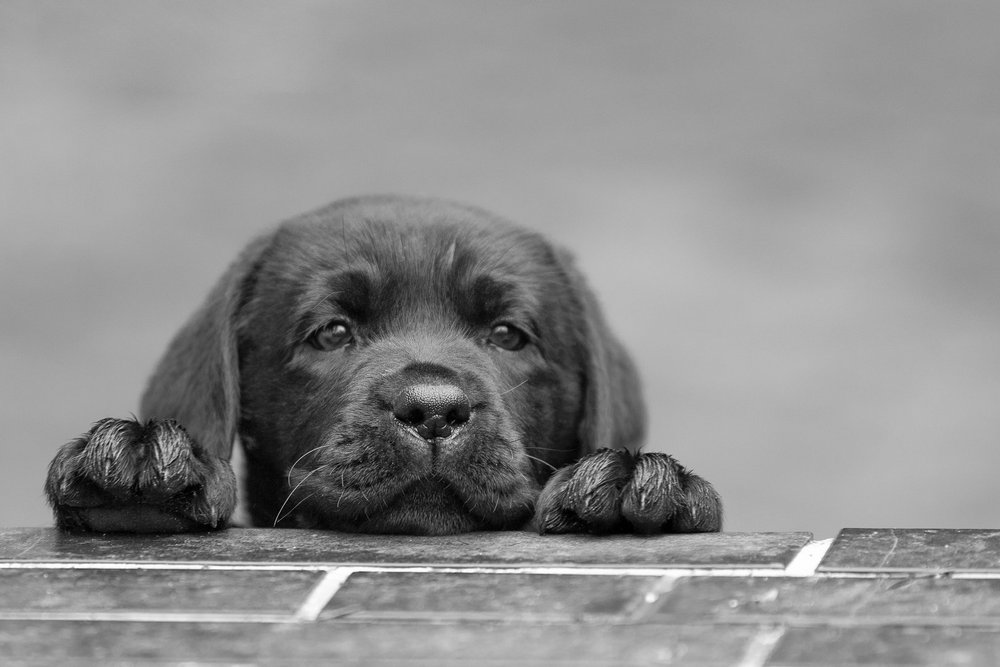The exhibition
The opening: 9 October (Thursday) at 7:00 p.m. at the Wozownia Gallery, the Biedermann’s Palace, (Franciszkańska 1/5)
The exhibition features works by three artists:
- Maria Apoleika (the author of “Psie sucharki”), drawings
- Jacek Laube (Lodz Film School), photography
- Natalia Pietrzak (a student of the Lodz Film School), photography
The exhibition is complemented by a study on dog senses prepared by scientists from the University of Lodz – Dr Katarzyna Majecka and Dr Dariusz Pietraszewski (Faculty of Biology and Environmental Protection, University of Lodz).
Maria's first project is divided into three blocks, each focusing on a different stage of a relationship: from puppyhood through maturity, to the autumn of a dog's life. Her second work focuses on the essence of walking a dog and exploring unusual spaces together. The artist has been observing the dog-human world for years and shares her insightful commentary with us.
Jacek and his dog, Juana, take us on a journey through the aesthetics of 20th-century photographers. In a subversive way, the artist reflects on his relationship with his dog and the truth of the photographic medium. Juana has become the inspiration for an artistic project—though she likely doesn't realise it.
In her artistic work and research, Natalia focuses on the remembrance of the relationship between humans and dogs. She analyses how caregivers commemorate their lost four-legged companions. She explores the emotions accompanying loss and the rituals associated with burial, mourning and life after the loss.
Conversation about the humanisation of dogs in cultural texts and the "dog baby" phenomenon
Time and place: 15 October at 6:30 p.m. at the Biedermann’s Palace
Do dogs laugh at their owners? What do we learn about dogs from literature and films? What are the consequences of treating our four-legged friends like humans in terms of family relationships?
The speakers: Dr Magdalena Piotrowska-Grot (Faculty of Philology, University of Lodz) and Adrianna Kaczuba-Kozic (Institute of Psychology/ Faculty of Educational Sciences, University of Lodz); moderator: Prof. Natalia Lemann (Faculty of Philology, University of Lodz)
Discussion about dog welfare in the context of breeders, shelters and foundations' activities
Time and place: 22 October at 6:30 p.m. at the Biedermann’s Palace (Franciszkańska 1/5)
Should we adopt a dog or buy one? How important is early socialisation for a dog's development? What can be done to prevent shelters from becoming overcrowded?
The discussion will be attended by: Albert Kurkowski (Animal Shelter in Lodz), Dr Katarzyna Majecka (University of Lodz), Elizabet Araj (OTOZ Animals Łódź), artist Maria Apoleika
Note: Before the meeting on 22 October (starting at 5:30 p.m.), we are holding a collection for animals at the Lodz Animal Shelter. We are collecting food (especially specialised pet food), blankets and towels, which will be distributed to animals in need. Accessories such as metal bowls and leashes (non-automatic) are also welcome. However, the shelter does not accept duvets, pillows, mattresses, sponges, rugs, carpets, sleeping bags or clothing. You will find a marked donation box in the lobby of the Biedermann’s Palace. This event precedes the November “Psia Kość” [Dog's Bone] campaign, which we will cover in a separate update.
A word from the curator
The curator of the “DOGSPECTIVE” project is Dr Bartosz Kałużny (Centre for External Relations and Social Responsibility of the University, University of Lodz), who says the following about the project:
The University of Lodz is joining the discussion on canine welfare and dog-human relationships, demonstrating that there is room within the academy for socially engaged projects that combine intellectual reflection and artistic endeavours. The University of Lodz research community is once again speaking out on important issues – after all, our relationship with animals is the measure of our humanity.
The shift in attitudes toward dogs over the past two decades is readily apparent – chained kennels are slowly disappearing from the Polish landscape, awareness is growing that prong collars are not a substitute for a collar, and more and more people are training their four-legged friends without using aversives. Importantly, they do this not for their own convenience, but for mutual understanding and successful cooperation. We are also less likely to thoughtlessly feed our canine friends leftovers from dinner, and Polish law now includes a fine for clipping a dog's ears or tail without a health-related reason.
Yet, animal shelters in Poland are still overcrowded, which demonstrates that as a society, we have work to do. We are far from achieving a collective consensus that dogs are not toys, cannot be unexpected gifts, that they have their own olfactory needs that cannot be satisfied by going out to pee in the square outside their apartment building several times a day. And that they don't understand what we say to them in our language until we teach them.

